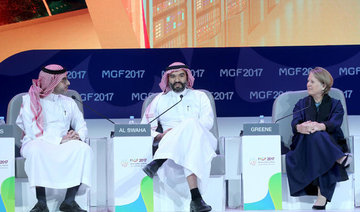RIYADH: Queen Rania of Jordan urged the Arab world on Wednesday to create more opportunities for its youth, strengthen its education systems and harness technology to empower its societies.
Saudi Crown Prince Mohammed bin Salman’s vision was one of “support for innovation and science, and opportunities to which young Saudis aspire,” the queen told the Misk Global Forum in Riyadh.
She called for the adoption of technologies that “add value to our lives,” expand educational and leadership opportunities for young people, and “provide them with opportunities to realize their potential and achieve their ambitions.”
“Let us inspire them to feel that the future is theirs, as we strive to create a fertile land for us and our children, a land where dreams are nurtured and can bear fruit,” the queen said.
In a powerful speech that drew cheers from an audience of mainly young Saudis, Queen Rania said the destructive impact of conflicts was felt by children across the region.
“How will we keep up with changing educational models and strengthen our education system, when 13 million Arab children are currently deprived of schooling, and the majority of the rest are offered an outdated education?” she said.
Queen Rania, who visited Rohingya refugee camps in Bangladesh last month, said: “Their reality — and that of others combating illness, poverty, ignorance and exclusion within our Arab world — hasn’t been changed by advances in science and technology, neither has innovation alleviated their suffering.”
The queen called for the motives for acquiring technology to be re-evaluated. “Rather than a race to the top for the privileged few, our priority should be employing technology to empower entire societies. What we need is technology with a heart — one that beats for us.”
A leading technology entrepreneur told the forum that women and young people would lead Saudi Arabia’s drive to embrace a digital future. “The excitement and embracing of change is so palpable here,” said Diane Greene, chief executive of Google Cloud. “I’m very optimistic about what’s possible here.”
In a session moderated by Arab News Editor in Chief Faisal J. Abbas, Saudi Minister of Communication and Information Technology Abdullah Alswaha said: “There couldn’t be a much better time in terms of unprecedented change. The rate of change right now is giving us a unique and a big window to leapfrog into the future.”
The digitization of the Saudi economy will be fully powered by youth, said Alswaha, with 70 percent of the population under the age of 30. “This gives the Kingdom a unique and competitive advantage powered by knowledge, entrepreneurship and innovation.”
Alswaha announced a new partnership between his ministry, Misk and the Mohammed bin Salman College for Business and Entrepreneurship to adopt 30 young local entrepreneurs and tech companies, such as Careem, the taxi app, and Telfaz, the internet TV app. “We will put them through a one-year program, get them exposure to the Silicon Valleys of the world, to the European successes in the world, introduce them to some venture capitalists and accelerators, and join hands with some big tech and knowledge powerhouses,” he said.
The Misk Global Forum brings young leaders, creators and thinkers together with established innovators to explore ways to meet the challenge of change. The Misk Foundation was established by Crown Prince Mohammed bin Salman in 2011 to empower Saudi youth to take part in the knowledge economy.
As the forum took place, Commerce and Investment Minister Dr. Majid Al-Qassabi issued 11 new licences to entrepreneurs in a new program to boost the growth of the small and medium-sized enterprise sector.
“Saudi Arabia offers extraordinary opportunities for foreign innovators and investors,” said Dr. Ghassan Al-Sulaiman, governor of Monsha’at, Saudi Arabia’s SME Authority. “ We know we have the talent — our job now is to match-make and provide the opportunities.”
























